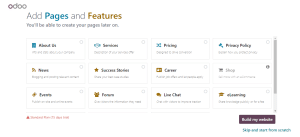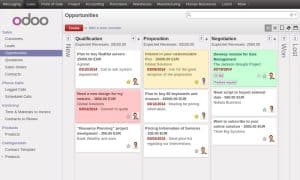In an ever-evolving business landscape, finding the right tools to enhance productivity and streamline operations is crucial. Odoo, an open source ERP system, stands out as a game-changer for businesses seeking comprehensive and customizable solutions. This article delves into the multifaceted benefits of Odoo, exploring its efficiency-improving capabilities, community-driven uniqueness, implementation strategies, integration advantages, and development practices using GitHub.
How Can Odoo Improve My Business Efficiency?
What are the key features of Odoo?
Odoo boasts a plethora of features that make it a robust solution for various business needs. This open source ERP system includes modules for accounting, inventory management, CRM, e-commerce, and human resources. Each of these modules can be tailored to specific business requirements, ensuring seamless collaboration across different departments. The integration of AI-driven analytics within Odoo aids in transforming raw data into actionable insights, allowing businesses to make informed decisions.
How does Odoo help streamline business processes?
Streamlining business processes is a key area where Odoo excels. By consolidating various operations into a single platform, Odoo reduces the complexity and redundancy often associated with managing multiple disparate systems. For instance, the CRM module within Odoo can automatically track customer interactions, providing a unified view and improving customer relationship management. Moreover, Odoo’s inventory management capabilities ensure real-time tracking of stock levels, reducing the likelihood of stockouts or overstock situations, and optimizing supply chain management.
Can Odoo be customized for specific business needs?
One of Odoo’s standout features is its high degree of customization. Through Odoo Studio, businesses can customize existing modules or create entirely new ones without deep technical knowledge. This flexibility allows Odoo to be tailored precisely to an organization’s unique processes and requirements. By leveraging the expertise of Odoo developers or consultants, businesses can implement workflows and interfaces that map directly to their operational needs, thus boosting productivity and efficiency.
What Makes Odoo Community Unique?
What is the Odoo Community Association (OCA)?
The Odoo Community Association (OCA) is a non-profit organization dedicated to the support and promotion of the widespread use of Odoo and its open source ideology. The OCA fosters a collaborative environment where developers and businesses contribute to the Odoo ecosystem, continuously enhancing its functionalities. This spirit of community-driven innovation stands as a testament to the power of open source software and the collective effort to create ERP solutions that are accessible and beneficial to all.
How can I contribute to the Odoo Community?
Contributing to the Odoo Community can be highly rewarding and impactful. Developers, users, and enthusiasts can participate by improving documentation, contributing code, or providing support to other users. The OCA organizes several events, hackathons, and sprints, providing ample opportunities for individuals to get involved. Additionally, sharing custom modules and enhancements on platforms like GitHub enables the broader community to benefit from individual contributions, fostering a culture of shared growth and innovation.
What are the benefits of using Odoo Community over Enterprise?
Choosing between Odoo Community and Odoo Enterprise depends on specific business needs and resource availability. The Odoo Community edition is open source and free to download, making it a cost-effective solution for businesses looking to leverage robust ERP functionalities without incurring licensing fees. Although it offers fewer features compared to the Enterprise edition, the Community version is highly customizable and can be enhanced with additional modules developed by the active Odoo community. This flexibility allows businesses to implement an ERP system tailored to their specific needs without significant financial investment.
How to Get Started with Odoo Implementation?
What are the steps to deploy Odoo?
Implementing Odoo involves several key steps. First, businesses need to assess their requirements and identify the modules they need. Next, downloading and installing Odoo, which supports PostgreSQL as its database management system, is straightforward, thanks to comprehensive documentation. Configuring the system to meet specific business requirements and migrating existing data follows installation. Finally, user training and going live are critical steps. Engaging with an experienced consultant can help ensure a smooth implementation process and minimize potential disruptions.
How to choose the right Odoo app for your business?
Choosing the right Odoo app involves understanding specific business operations and requirements. The Odoo Business Apps Store provides a wide array of apps tailored for various functions, from inventory management to customer relationship management. Evaluating the features and functionality of each app against your business needs is essential. A demo of the apps can provide practical insights into their usability and impact on business processes. Engaging with Odoo consultants can also aid in selecting the most suitable apps and customizing them to match unique operational workflows.
What resources are available for Odoo developers?
Odoo developers have access to a wealth of resources designed to enhance their capabilities and streamline development processes. Comprehensive documentation, e-learning modules, and active forums provide foundational knowledge and troubleshooting assistance. GitHub repositories host numerous custom modules and enhancements, offering valuable insights and reusable code. Developers can also attend Odoo Experience events and other community gatherings to learn from peers and stay updated on the latest developments. Engaging with these resources ensures developers are well-equipped to develop and optimize Odoo-based solutions.
What Are the Advantages of Odoo Integration?
How can Odoo integrate with other business applications?
Odoo’s flexibility extends to its ability to integrate seamlessly with other business applications. Whether it’s integrating with e-commerce platforms, payment gateways, or third-party logistics providers, Odoo’s robust API facilitates smooth data exchange and operational synergy. This integration capability ensures that critical business functions work in harmony, reducing data silos and enhancing overall operational efficiency. The ability to integrate with popular applications like Salesforce or Google Workspace further expands Odoo’s utility as a comprehensive business platform.
What are the common challenges faced during Odoo integration?
Despite its robust capabilities, Odoo integration can present certain challenges. Data consistency and synchronization between Odoo and other applications can be complex, necessitating careful planning and execution. Customization requirements can also lead to longer development cycles if not managed properly. Security considerations are crucial when integrating multiple systems to prevent vulnerabilities. Engaging with skilled developers and leveraging best practices in data management and security can mitigate these challenges and ensure a successful integration process.
How does integration enhance the functionality of Odoo?
Integrating Odoo with other business applications significantly enhances its functionality by creating a unified ecosystem. This synergy enables real-time data sharing, improving decision-making and operational response times. For instance, integrating Odoo’s CRM with email marketing tools can automate and personalize customer outreach efforts. Similarly, connecting Odoo’s inventory management system with an e-commerce platform ensures accurate stock tracking and seamless order fulfillment. Such integrations leverage the strengths of diverse applications, resulting in a cohesive and more powerful business solution.
Odoo vs. SAP Business One
Odoo and SAP Business One are both comprehensive ERP solutions, but they cater to different business needs and scales. Odoo is known for its flexibility and modular approach, allowing businesses to start with basic modules and expand as needed, making it ideal for small to medium-sized enterprises. It offers a user-friendly interface and a wide range of applications that integrate seamlessly. In contrast, SAP Business One is tailored more towards larger businesses with complex needs, providing robust analytics, in-depth reporting, and extensive industry-specific solutions. While Odoo offers cost-effective customization and ease of use, SAP Business One delivers advanced functionalities and scalability for growing enterprises.
How to Utilize GitHub for Odoo Development?
What are best practices for managing Odoo projects on GitHub?
Managing Odoo projects on GitHub requires adherence to best practices to ensure code quality and collaboration efficiency. Utilizing version control helps track changes and revert to previous states if necessary. Creating clear and concise commit messages aids in understanding the history of changes. Branching strategies, such as feature branching, facilitate parallel development efforts without conflict. Thorough code reviews and continuous integration processes ensure that the codebase remains stable and reliable. By following these practices, Odoo developers can maintain high standards in their project management.
How to collaborate with other developers using GitHub?
GitHub fosters collaboration among developers through its suite of tools designed for teamwork. Issues and pull requests enable developers to discuss and review code changes before merging them into the main branch. Collaborative features like project boards and wikis assist in organizing tasks and documenting important project information. Open-source contributions are a cornerstone of Odoo’s development, with developers around the globe collaborating on GitHub to enhance and build upon each other’s work. Effective communication and project management are key to successful collaborations on this platform.
What are some popular Odoo repositories on GitHub?
Several Odoo repositories on GitHub are widely recognized and utilized within the community. The official Odoo repository maintained by Odoo S.A. contains the core codebase and is a central resource for developers. Repositories managed by the Odoo Community Association (OCA) feature a plethora of community-developed modules and enhancements that extend Odoo’s functionality. Additionally, numerous developers and companies share their custom modules, offering innovative solutions and best practices. Exploring these popular repositories can provide valuable insights and accelerate development efforts.






